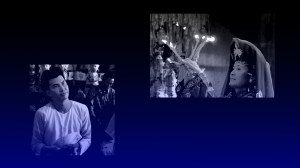In this series
In the last decade, shamanism has undergone a revival in South Korea, particularly among younger generations, which are moving away from institutional religions. While not entirely supplanting traditional institutional religions, shamans offer personalized, one-on-one counseling that appeals to younger Koreans.
This resurgence is evident in popular culture, as seen in the highly successful 2024 film Exhuma and reality TV like Possessed Love, a dating show featuring good-looking shamans. Such shows offer a modernized and sophisticated portrayal of young shamans. Unlike traditional institutional religions, shamans have become accessible spiritual consultants, equipped with an approachable and nonauthoritarian image.
Shamanism represents one of the most ancient forms of religion in Korea. Its date of origin is unclear, but it was around the Three Kingdoms Period and before Buddhism arrived in the sixth century.
Shamanistic rituals, like communicating with dead souls, were regarded as obscene and vulgar in the Chosŏn dynasty (1392–1910) and continued to face stigmatization during the postcolonial era. Despite this public stigma, shamanism has maintained its significance in private spheres and is increasingly recognized as a distinctive Korean cultural heritage. Notably, shamanism exists outside official religious statistics in Korea. Many nominally nonreligious Koreans acknowledge spiritual entities and engage in Buddhist or shamanistic practices.
The relationship between shamanism and Korean Christianity reflects traditional gender roles in the Korean religious landscape. Since the establishment of the Chosŏn dynasty, shamanism and Buddhism were relegated to the private female sphere of the household and pushed out of public life. Despite persecution, both traditions persisted privately, largely practiced by women fulfilling customary spiritual duties. This pattern continues in Korean Christianity, where women’s religious roles center on practices for family success and health.
This traditional female engagement with spiritual entities has shaped, whether consciously or unconsciously, Korean evangelicals’ understanding and sensitivity toward spiritual beings. Among Korean evangelicals, the concept of spiritual warfare is not merely abstract but representative of the tangible interference of evil spirits in their daily lives. This awareness of these evil spirits is supplemented by the contemporary revival of shamanism.
One example of this spiritual sensitivity is found in revival meetings called simnyŏng puhŭnghoe. Since the 1970s, these gatherings have emphasized healing practices reminiscent of traditional shamanistic rituals, as noted by James Huntley Grayson in Korea: A Religious History. The healing prayer, where revivalists known as puhŭngsa lay hands on believers, demonstrates a clear connection to shamanism’s strong tradition of therapeutic rituals. In addition, there is a prevalent belief that the spiritual authority of the person performing such a prayer can lead to more powerful divine responses.
An extension of this practice can be found in a hall of prayer, or kidowŏn. Some churches have built large prayer facilities on mountains, which are traditionally recognized by shamans as a spiritually rich environment. Shamans often bring their clients to the mountains to perform rituals there, because this location is viewed as more efficacious than the shaman’s own shrine. This also influenced the development of san’gido (mountain prayer) culture among Korean Christians, which involves praying outdoors or praying while holding onto trees as a sign of strong devotion to God.
Korean shamanism fundamentally conflicts with Christian theology, particularly as articulated in Deuteronomy 18:9–18, which explicitly warns against mediums, spiritists, and those who consult the dead. These practices are central to the role of Korean shamans, who, as spirit mediums, communicate with the dead and resolve spiritual issues by invoking the power of strong deities.
While shamanism has helped to grow an awareness of spiritual beings in Korean society and has become trendy among young Koreans, it is ultimately opposed to God’s commands. Churches can address the allure of shamanism in their congregations by showing young people who Jesus is and what he has done. Most churches talk about Jesus as God, but they do not emphasize his humanity as much. Some Korean YouTubers, who may not identify as Christian, are sharing more about Jesus’ actions on earth, like pursuing justice and helping the poor. One animated video published in September about Jesus’ compassion and forgiveness has racked up more than a million views.
Yohong Roh is an instructor of religious studies at Louisiana State University. Read more in our series’ lead article, Shamans, Sorcerers, and Spirits: How Christians in Asia Grapple with the Supernatural.

















